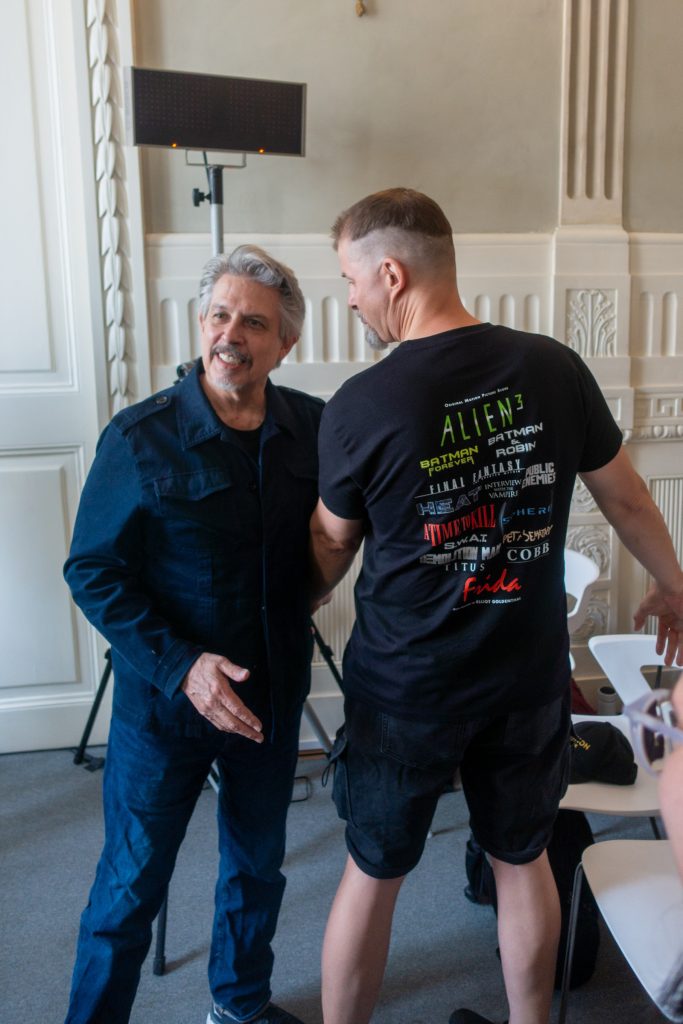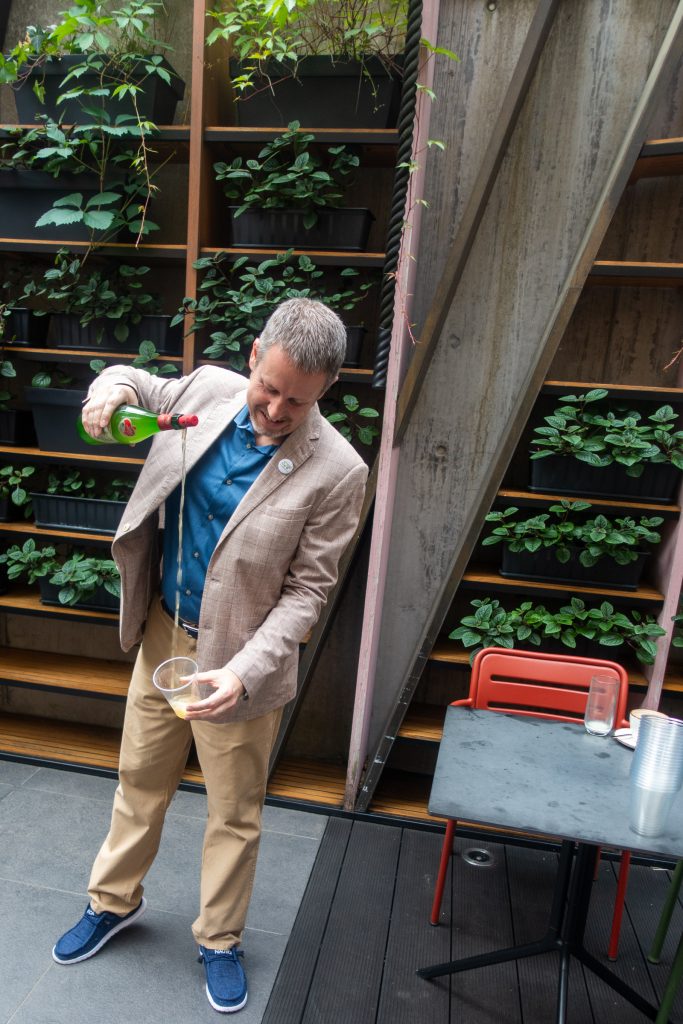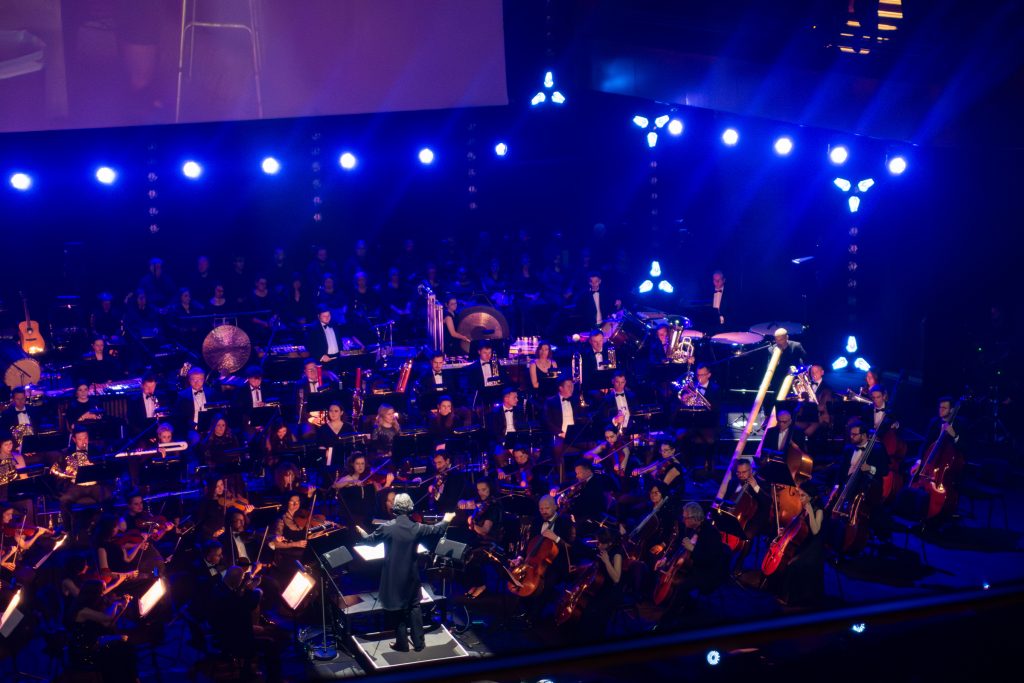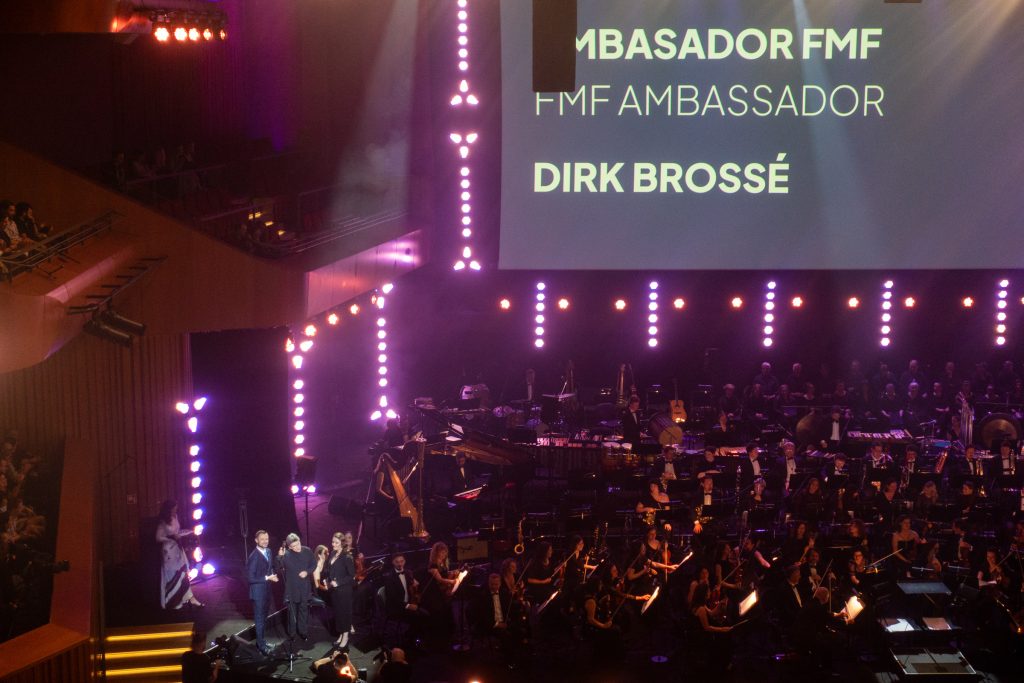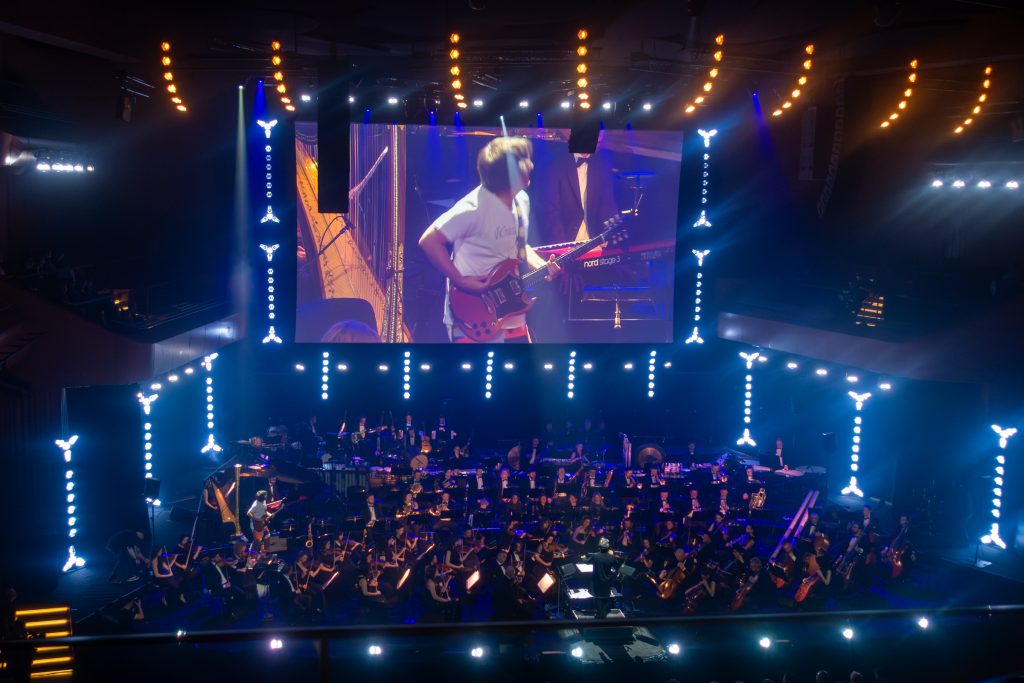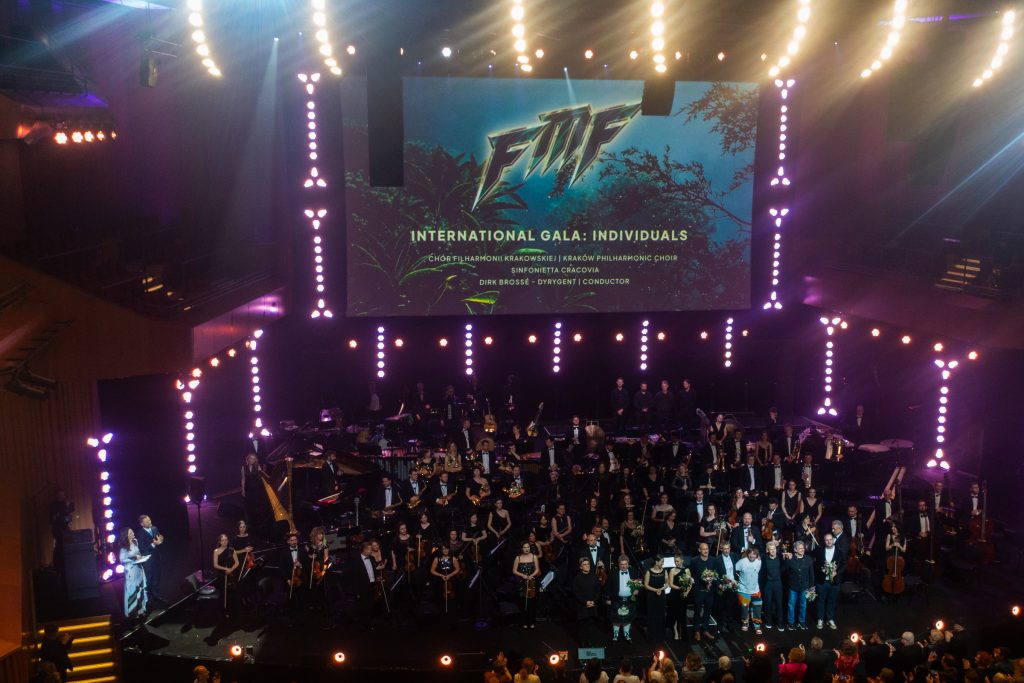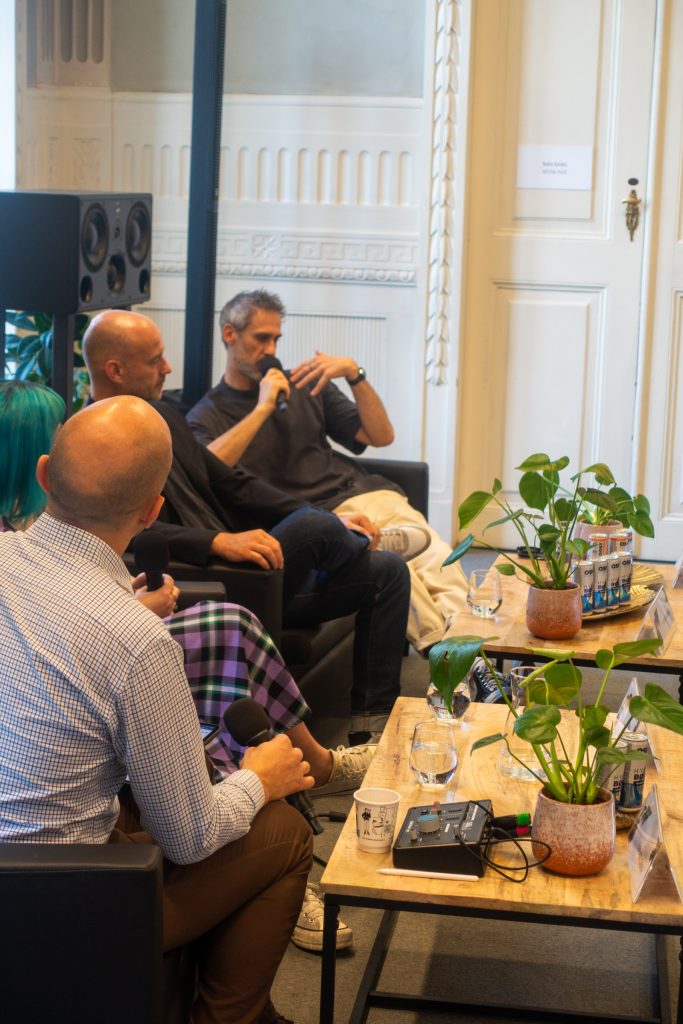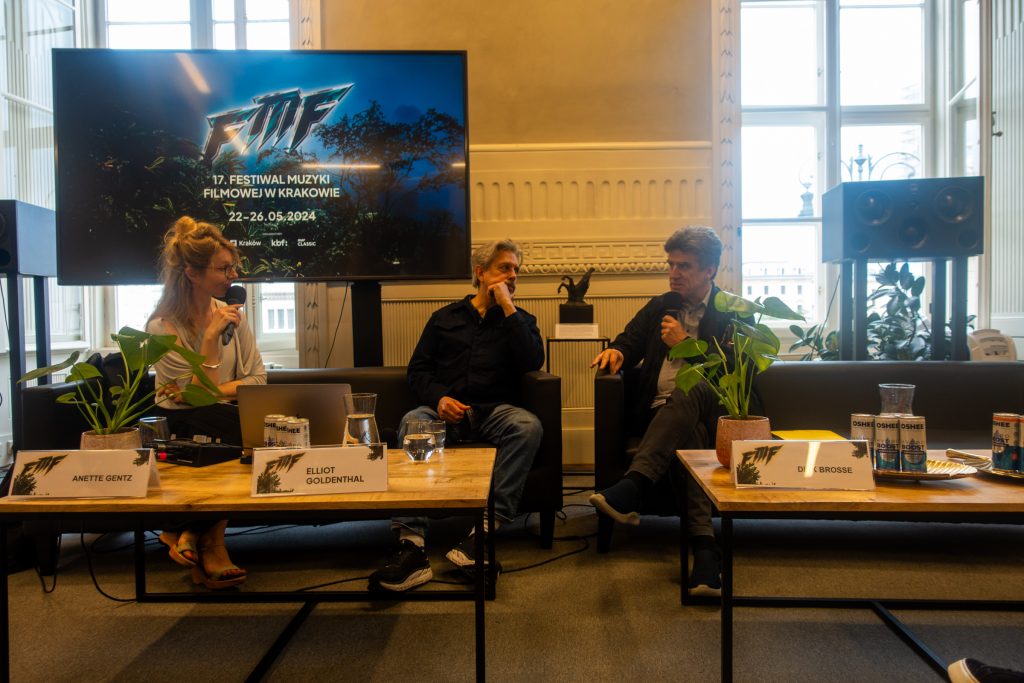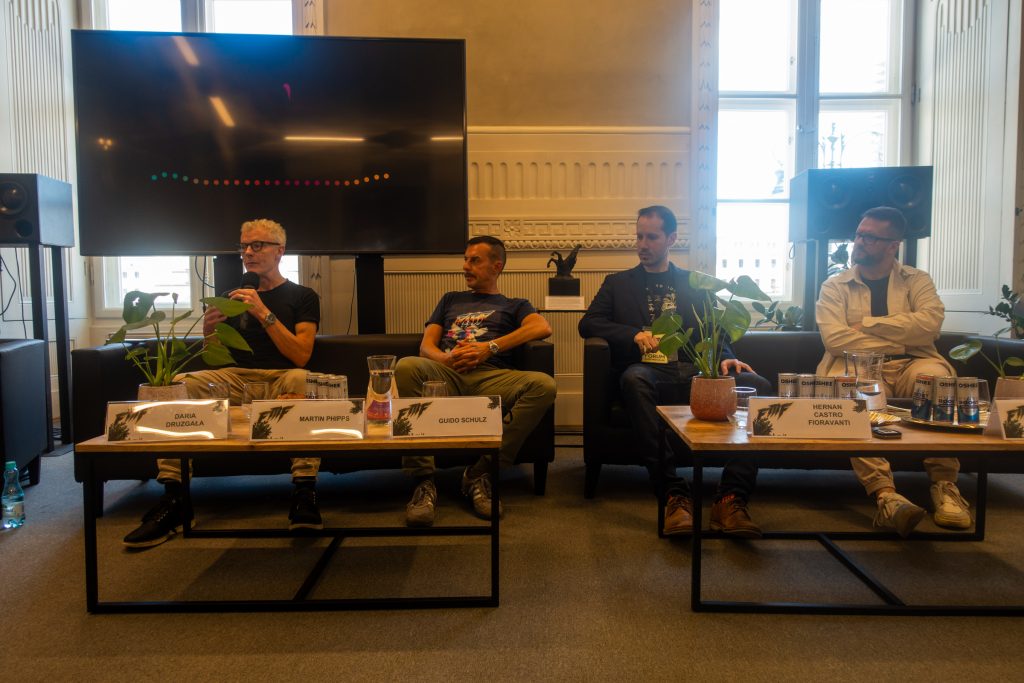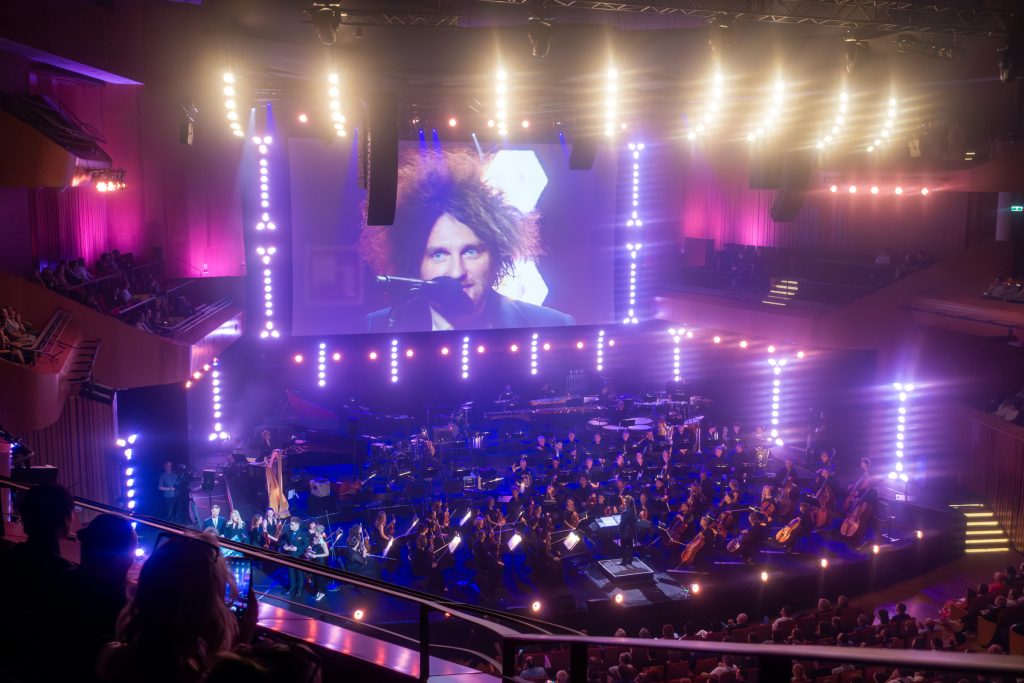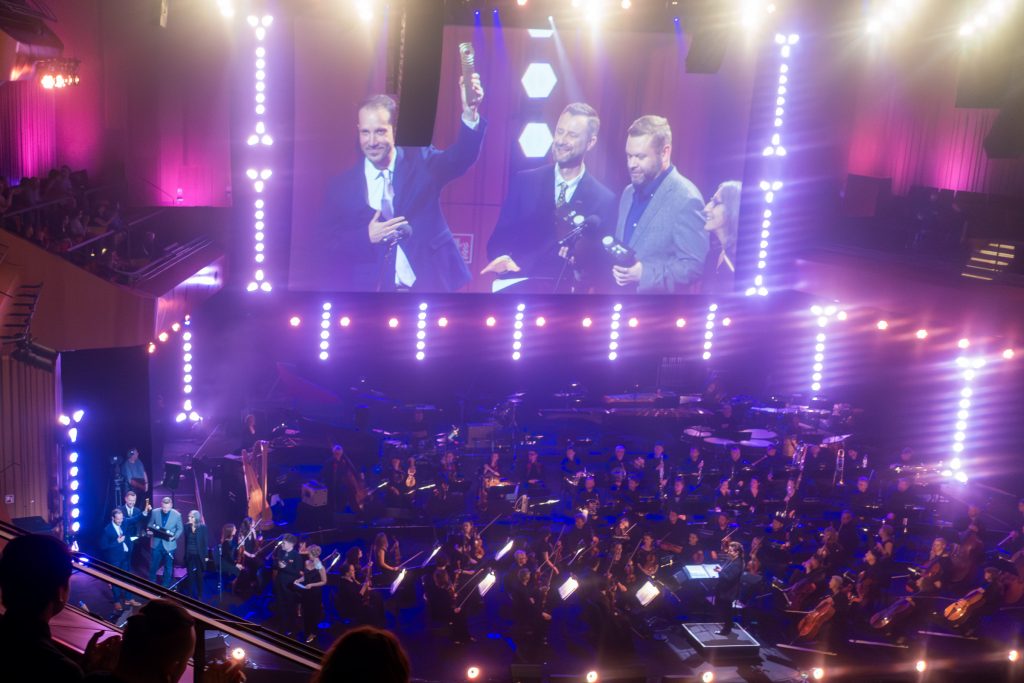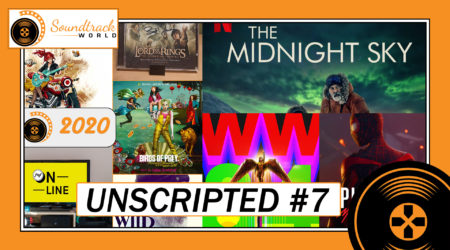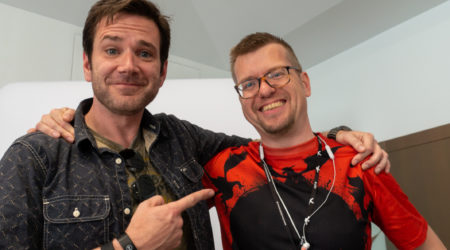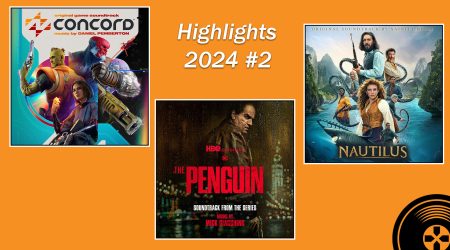The Krakow Film Music Festival (FMF) in Poland is a festival I have been attending for many years, and you can find my reports about all the festivals since 2011 online. These reports have found their home here at Soundtrack World since 2017, including this report about the 17th edition. This latest edition was held from May 22 to 26 and included many concerts, workshops and other events, such as a silent disco or meet and greets with composers. For this edition, many excellent guests were announced, including Martin Phipps, Daniel Pemberton, Rob Simonsen, Anthony Willis and returning guest and Oscar-winner Elliot Goldenthal. In addition to these amazing international artists, many Polish composers were invited as well, including upcoming Polish film music composers like Paweł Lucewicz and Łukasz “L.U.C.” Rostkowski, who were both nominated for IFMCA Breakthrough Composer of the Year Awards.
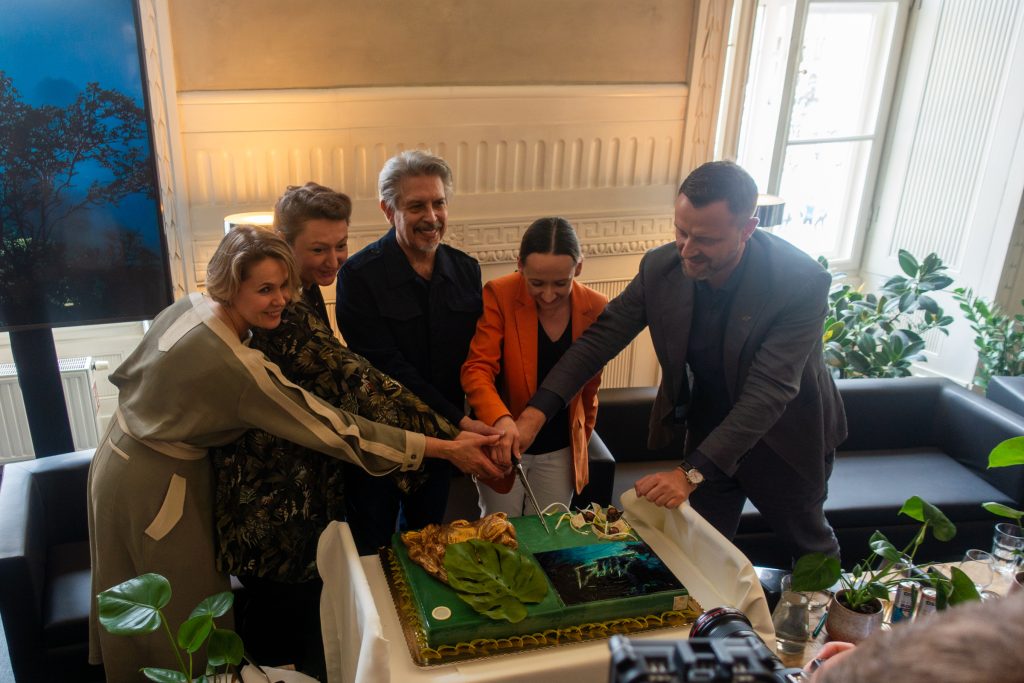
For this edition, I had quite some content to write, because of the many extraordinary and unique moments that happened. Have you ever seen Daniel Pemberton screaming his lungs out on stage or a conductor beatboxing in a microphone while conducting? Me neither, and both happened during this edition. So strap in because this report will be a long ride. If that is too much, do not worry about skipping parts of this report, but please read the conclusion at the end, because I have quite some thoughts that I want to express about the incredible things this festival is doing.
The concerts
The five-day festival program contained no less than seven concerts, not counting one that was held twice. These concerts were held in four different-sized venues, ranging from a tiny concert hall that could hold only around 100 people to the large sports arena in Krakow that sold out for an audience of 16,000.
May 22: Traces of Memory
The first concert was a film and contemporary music hybrid where the program was centered around anniversaries. One of them was the 30th anniversary of the movie Schindler’s List, which is based on a true story involving the famous Schindler factory in Krakow. The first half of the concert was dedicated to that film, with a wonderful suite from the movie, but also with a live performance of the Klezmer band Kroke, who caught Spielberg’s attention many years ago, and he invited them to perform at a ceremony for Schilder’s List survivors in Krakow. In addition to the music related to Schindler’s List, the concert had to be opened with a moment of silence and music from Jan A.P. Kaczmarek, who passed away the day before. Lastly, we could also listen to music from the war documentary In the Rearview. by Antoni Komasa-Łazarkiewcz during the first half.
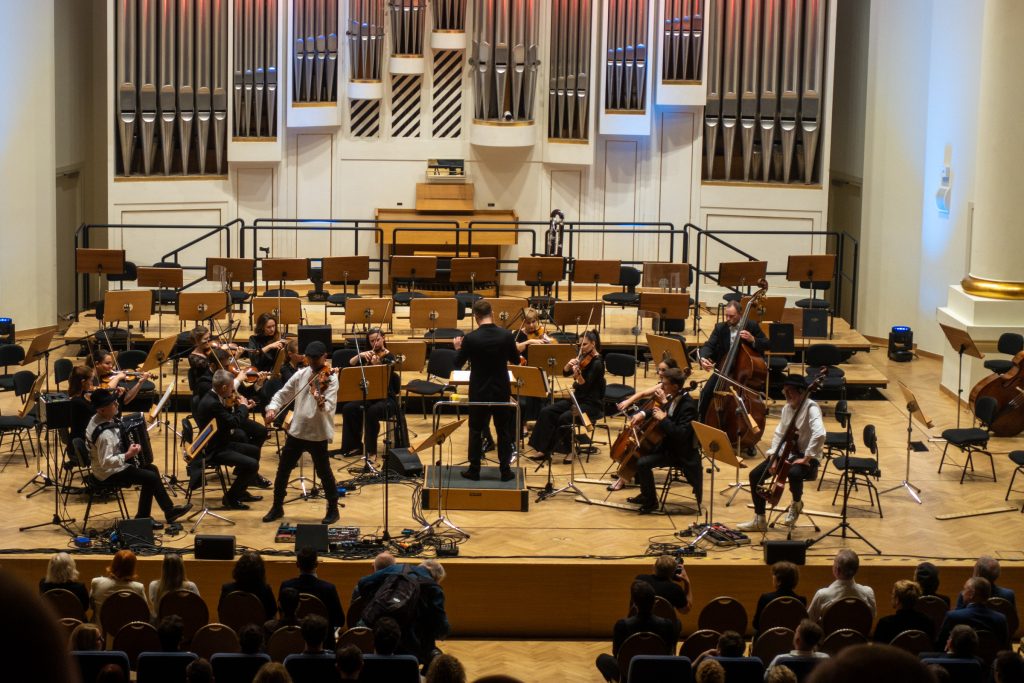
One of the pieces in the second part of the program was Goldenthal’s 3rd Symphony, which is based on Polish poems written by Barbara Sadowska in communist times. Before we could listen to this typical Goldenthal piece, a piece by Krzysztof Penderecki, with whom Goldenthal became friends during a previous edition of the FMF, was performed.
This concert was very special. While film music was not the real focus, it was a wonderful showcase of the problems that Poland had been facing and continues to face. Hopefully, things will get better in the future, but it at least resulted in some interesting music that we could hear that night.
Concert information
Orchestra: Kraków Philharmonic Orchestra conducted by Alexander Humala
Guest: Elliot Goldenthal
Artists: Agata Szymczewska, Natalia Rubiś, Mary Komasa and Kroke
Venue: Philharmonic Hall
Program
- Jan A.P. Kaczmarek – “Unfaithful” from Unfaithful
- Karaoke – The Best of Kroke
- Antoni Komasa-Łazarkiewcz – “Skrzydła” from In the Rearview
- John Williams – Three Pieces from Schindler’s List
- Theme
- Jewish Town (Krakow Ghetto – Winter ‘41)
- Remembrances
Intermission
- Krzysztof Penderecki – Ciaccona in memoria del Giovanni Paolo II
- Elliot Goldenthal – Symphony No. 3
- Mam na imię… (My name is…)
- We mnie (Within me…)
- Boża krówka rakowiecka
- Sen (Dream)
- Pazurki (Claws)
May 22: Synthesizer Legends | Kebu
On the same day as the Traces of Memory concert, another event was planned on the other side of the large city of Krakow. The star of this show was Finnish synthesizer legend Kebu, who literally surrounds himself with analog synthesizers to perform covers of amazing synthesizer music from the past as well as his own material. After seeing him perform in Prague many years ago, I was looking forward to his concert, especially his version of Blade Runner. Unfortunately, that piece had already been performed when I entered the small venue packed with fans, because of the scheduling conflict with the other concert on that day. Fortunately there were many fantastic songs left that I enjoyed, including “Oxygen” and the themes from Top Gun and The Terminator.
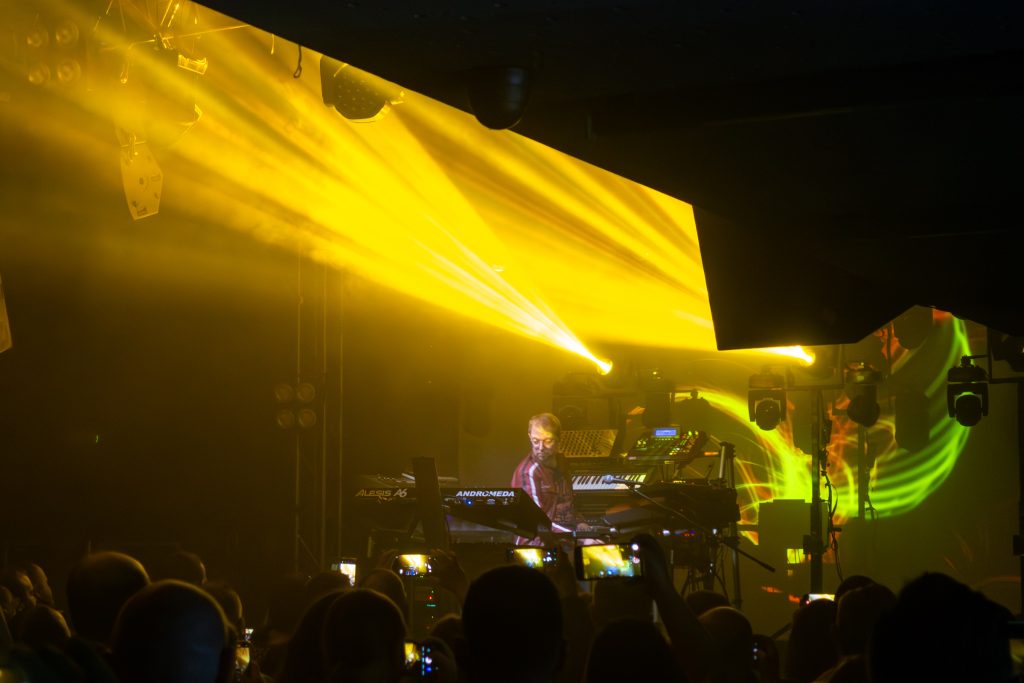
I have heard from several people at the festival that they were disappointed they could not attend the entire concert or did not even go. The location was just too far away from the city center to reach after the previous concert. If I am being honest, a different time, or at least a venue closer to the other ones, would have been better. That way more people would have been able to enjoy Kebu’s excellent performance.
Concert information
Artist: Kebu
Venue: Klub Kwadrat
May 23: International Gala: Individuals
Every year the FMF has a concert dedicated to international guests. During these concerts we can enjoy their works being performed, which are often new pieces that I have not heard live before. In previous years these kinds of concerts had a focus on a particular theme, but since this year’s theme was “Individuals,” there was not really a commonality this time, and we could just enjoy a random selection of the guests’ music.
The concert started with the music by Rob Simonsen. His music for The Whale stood out the most, with an extremely long pipe, which was blown into to create an exciting foundation for the rest of the music from that movie. After Simonsen’s music, it was time to announce the new FMF Ambassador, and the maestro of the evening, Dirk Brossé, had the honor of receiving that award this year. After returning in front of the orchestra, Brossé started to conduct the music from Anthony Willis, including his latest work on Saltburn and the eerie sounds of M3gan, but what stood out to me was his take on the iconic soundscape of How To Train Your Dragon, since he composed the music for the short holiday special How To Train Your Dragon: Homecoming. After having written additional music for John Powell on some of the original movies, it was interesting to see his take on the music.
I was very much looking forward to the second half of the program and it started strong with the music by Martin Phipps. His music for Napoleon was incredibly impressive, including having Corsican singers on stage to perform that iconic piece from the film. Phipps’ music was only the beginning because it was time for Daniel Pemberton’s pieces afterwards, which I could not wait to hear. It started with some traditional film music pieces from him, but when I thought that his music for King Arthur: Legend of the Sword was done after hearing the fantastic “The Born King,” the music for “Growing Up Londinium” kicked in, and Pemberton entered the stage in T-shirt and orange pants and started to scream his lungs out in the microphone. For the next couple of pieces Pemberton sat behind the piano until his finale, for which he grabbed the guitar to start jamming on his music from Spider-Man: Across the Spider-verse. He was able to exceed my expectations once again.
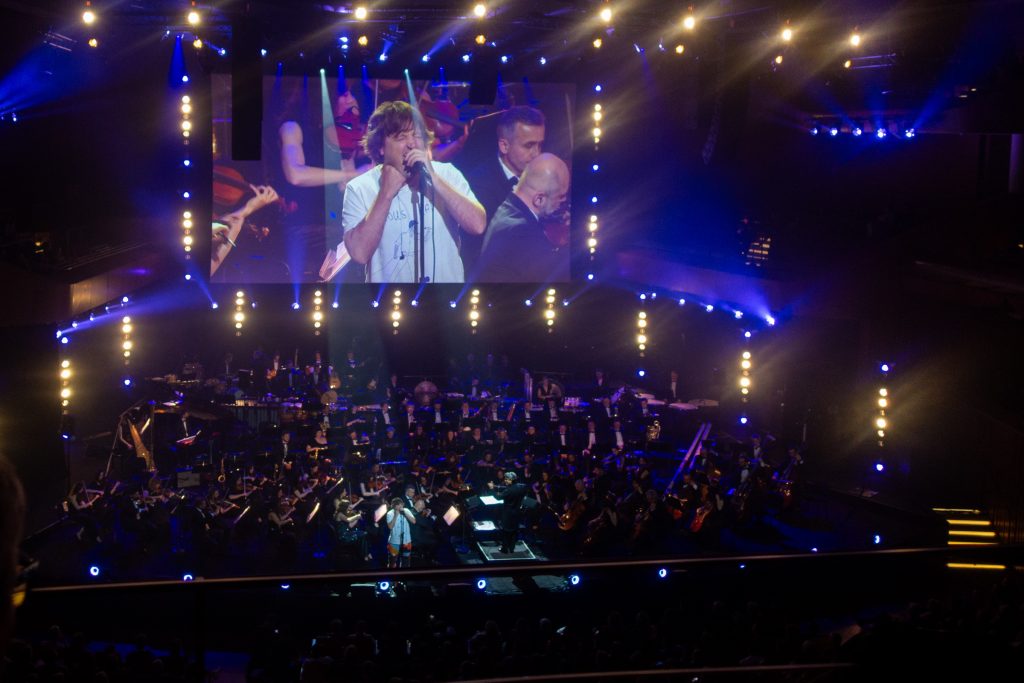
It would be hard to surpass these amazing pieces from Pemberton, but if there is one composer who is able to do that, it is Elliot Goldenthal. I heard his Grand Gothic Suite, with music from Batman Forever and Batman and Robin, many years ago when the FMF was still giving concerts in the factory hall, but I was still blown away by how brilliant that suite with his music for the Batman movies is.
This concert with international guests has always been my favorite during the festival. To experience music that I have not heard live before, or at least not often, is why I like this type of concert so much. Another aspect that made this an excellent evening was the great use of soloists with various instruments to give the scores their authenticity. It was a fantastic concert and I am quite curious what next year’s concert will bring and who the international guests will be.
Concert information
Orchestra: Sinfonietta Cracovia conducted by Dirk Brossé
Choir: Kraków Philharmonic Choir
Guests: Elliot Goldenthal, Daniel Pemberton, Martin Phipps, Rob Simonsen and Anthony Willis
Artists: Magdalena Wasylik, Winne Clement, Lindsay Davidson and Jerycho
Venue: ICE Kraków Congress Centre
Program
- Rob Simonsen
- Age of Adaline
- The Whale
- The Adam Project
- Anthony Willis
- Serenade for Hollywood
- Femme Fatale Suite: Promising Young Woman, M3gan
- How To Train Your Dragon: Homecoming
- Saltburn
Intermission
- Martin Phipps
- Napoleon
- The Crown
- Daniel Pemberton
- All the Money in the World
- Black Mirror – USS Callister
- Motherless Brooklyn
- King Arthur: Legend of the Sword
- Being the Ricardos
- Enola Holmes
- The Trial of the Chicago 7
- Across the Spider-verse
- Elliot Goldenthal – Grand Gothic Suite
May 24: Piano Chorale | Aleksander Dębicz
During many editions of the festival, concerts with a focus on a piano or a focus on a choir have been included in the program. Pianist Aleksander Dębicz probably thought that combining these two elements would be a great idea, resulting in this concert with piano and choir. For some pieces they also used an organ, but its role was almost always subtly in the background.
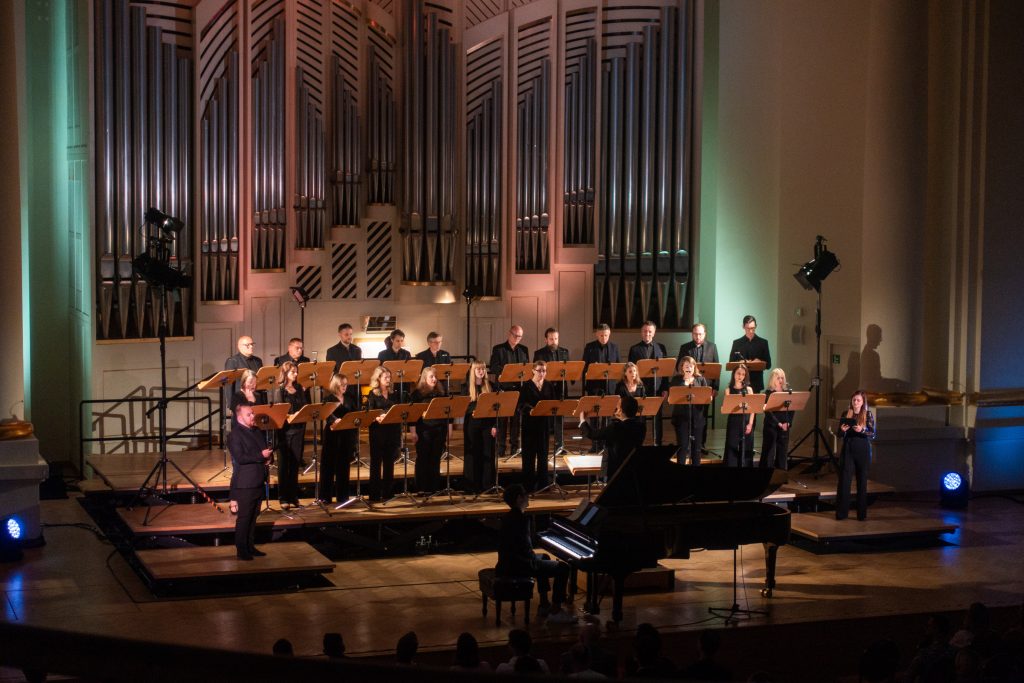
We were treated to wonderful piano and choir music during the evening, with many pieces from the international guests. While I loved the concert, I did not really recognize any of the pieces that were brought to the stage. That stopped when the extraordinary “Vide Cor Meum” from Hannibal was performed, a cue written by Patrick Cassidy, who was also present that night. I also recognized the music from Amsterdam and Edward Scissorhands after it, but the evening’s finale was very well known for a broader audience, even in this setting. With an organ present, music from Hans Zimmer’s Interstellar had to be performed, and this version was breathtaking.
As a massive choir and organ fan, I had a wonderful evening. I loved the contrast of the soothing choir and piano music with the bold sounds from the evening before. It shows how diverse film music is and that its melodies can be performed in various musical settings.
Concert information
Choir: Polish Radio Choir Lusławice conducted by Karol Knapiński
Piano: Aleksander Dębicz
Organ: Adam Tański
Other artists: Maria Klich, Jadwiga Woźniacka, Dorota Strączek and Krzysztof Michalski
Guests: Patrick Cassidy, Daniel Pemberton, Martin Phipps, Rob Simonsen and Anthony Willis
Venue: Philharmonic Hall
Program
- Rob Simonsen – “Gloria’s Theme” from Two Is a Family
- Nicholas Brittel – If Beale Street Could Talk
- Aleksander Dębicz – Forest Might Fight
- Anthony Willis – The Shadow Song
- Hans Zimmer, Benjamin Wallfisch – Themes from Blade Runner 2049
- Aleksander Dębicz – Cedar Tree
- Antoni Komasa-Łazarkiweicz – “Requiem” from 1983
- Jean-Baptiste de Laubier, Arthur Simonini – Song from Portrait of a Lady on Fire
- Martin Phipps – Theme from Victoria
- Patrick Cassidy – “Vide Cor Meum” from Hannibal
- Daniel Pemberton – “The French Lady”, “Amsterdam” from Amsterdam
- Danny Elfman – “Ice Dance” from Edward Scissorhands
- Hans Zimmer – Themes from Interstellar
May 25: Polish Gala: Modern Roots
Another traditional concert at this festival, as is the case with the one with international guests, is a concert focusing on Poland. May it be music from movies by a Polish director, music by one specific Polish composer, or, in this case, music from various Polish composers. Two awards were also announced this evening. The Polish Soundtrack of the Year Award went to Paweł Lucewicz for Znachor (English title: Forgotten Love). There was also a small Dutch celebration during this Polish evening with the FMF Young Talent Award going to Hernan Castro Fioravanti, who was born in Argentina but works and lives in the Netherlands.
During the evening, we were treated to all kinds of music from different Polish composers, many of whom brought their own musicians, who played with the orchestra. Most of the music would be new to me at these Polish concerts, but with two IFMCA Award nominees participating, I was familiar with some of the music. The music for Forgotten Love by Paweł Lucewicz was especially lovely, and I did not expect how fantastic the music for Peasants by Łukasz “L.U.C.” Rostkowski, who took up the baton himself, would be. I learned about Rostkowski only at the end of last year, but apparently he is a Polish artist who has been popular for many years and just wrote his first score. His roots are in rap music, and he showed off that skill by starting to beatbox on stage while still conducting the orchestra. It was undoubtedly one of those “You had to be there” moments and is one of the reasons why I like these Polish concerts so much.
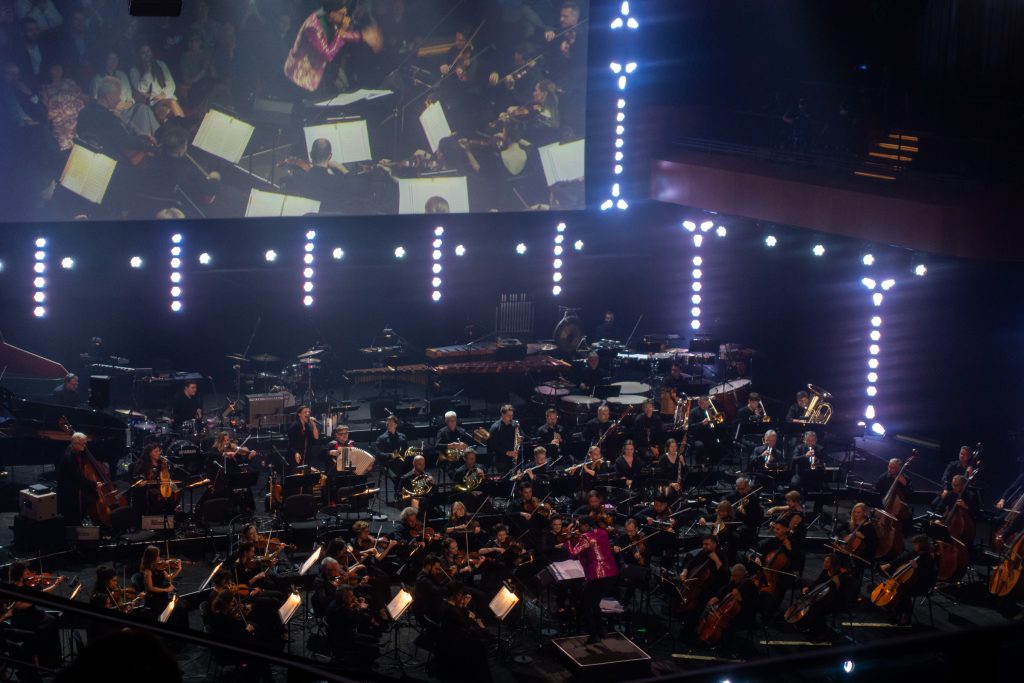
Concert information
Orchestra: Kraków Philharmonic Orchestra conducted by Katarzyna Tomala-Jedynak and Łukasz “L.U.C.” Rostkowski
Artists: Dorota Miśkiewicz, Marek Napiórkowski, Henryk Miśkiewicz, Michał Tokaj, Robert Kubiszyn, Paweł Dobrowolski, SVAHY, Kasia Gacek-Duda, Zazula, Bart Pałyga, Agnieszka Przekupień, Klaudia Łoboda, Ignacy Matuszewski, Maria Pomianowska, Karolina Skrzyńska, Szymon Madej, Sebastian Wypych, Piotr Kopietz and Weronika Mońka-Chwała
Guests: Paweł Lucewicz, Hernan Castro Fioravanti, Łukasz “L.U.C.” Rostkowski, Arkadiusz Reikowski, Marek Napiórkowski, Stanisław Syrewicz and Jerzy Rogiewicz
Venue: ICE Kraków Congress Centre
Program
- Marek Napiórkowski – Bejbis
- Stanisław Syrewicz – 30 Door Key, Clandestine Marriage
- Jerzy Rogiewicz – 1670
Intermission
- Paweł Lucewicz – Forgotten Love
- Hernan Castro Fioravanti – Young Talent Award ceremony
- Łukasz “L.U.C.” Rostkowski – Peasants
- Arkadiusz Reikowski – Blacktail
May 26: John Williams for Three
Concerts can be held in many different sizes, and the matinee concert John Williams for Three falls into the category of being one on a more intimate scale. This concert was staged in a small room that could only host around 100 people, which is a perfect size for a performance of only three musicians. These musicians were Sara Andon on flute, Simone Pedroni on piano and Cecilia Tsan on the cello. Together, they performed a wide selection of pieces by John Williams.
When I think of John Williams’s music, I always have an orchestral score in mind, but these three musicians showed me that a lot of his music is also ideally suited for a smaller ensemble. Another aspect that I liked about this concert was the choice of music. They did not go for the most iconic cues Williams is known for, but instead performed many lesser-known pieces that showcase how amazing his entire repertoire actually is.
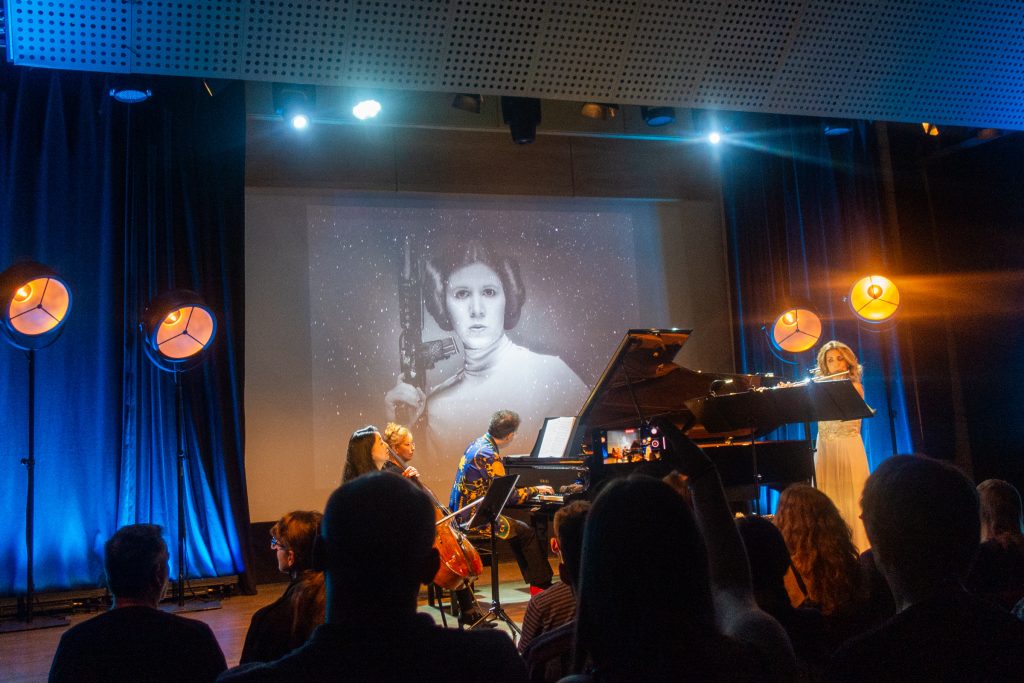
The intimate setting helped elevate the concert experience, with the audience being so close to the musicians. This success also had its drawbacks, however, since the concert sold out very quickly and an extra concert was put on the program at 3 PM. The problem with that starting time was that you would be unable to attend the festival’s final concert two hours later on the other side of town.
Concert information
Piano: Simone Pedroni
Flute: Sara Andon
Cello: Cecilia Tsan
Venue: Manggha
Program
- Star Wars: Princess Leia’s Theme
- Jane Eyre: To Thornfield, Reunion
- Memoirs of a Geisha: Sayuri’s Theme, Going to School
- The River: The Pony Ride
- Hook: The Face of Pan
- A.I.: The Reunion
Intermission
- Schindler’s List: Theme
- Dracula: End Titles
- Sabrina: How Can I Remember?
- The Witches of Eastwick: The Tennis Game, The Seduction of Suki and The Ballroom Sequence, The Devil’s Dance
- Far and Away: County Galway, Joseph and Shannon, Blowing Off Steam, Final
- The Fabelmans: Theme (encore)
- The Patriot: Suite (encore)
- E.T.: Over the Moon (encore)
May 26: Disney’s The Lion King in Concert
Every year, the festival dedicates one concert to a movie with live music, and this time was no different with a screening of The Lion King with a live orchestra. What was different was that we finally returned to the massive Tauron Arena for this concert, which the festival has not used since COVID.
What makes The Lion King such a great movie, next to the incredible story, is Hans Zimmer’s music and the iconic songs, which were performed live on stage by Polish singers. Those performances are always interesting for me to listen to as someone who does not speak Polish, and they were well done. Even the two children did their very best, and I found them to be even better than some of the adult singers, who apparently did not know the lyrics well and could not keep their eyes away from the monitor to read the lines.
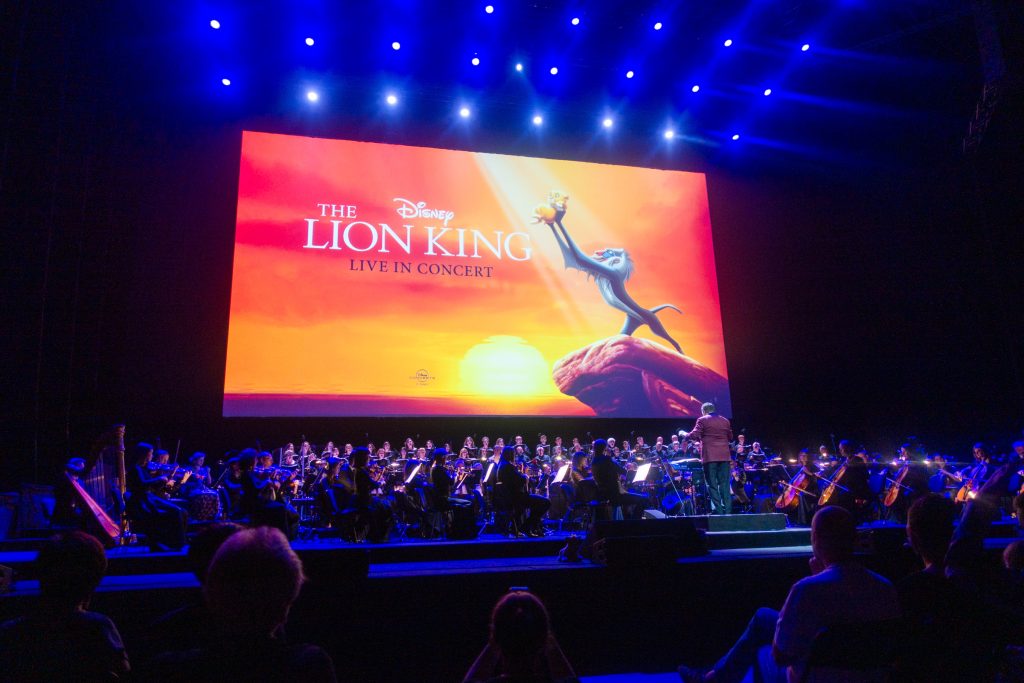
It was lovely to see the film again, and the live orchestra with Erik Ochsner at the helm made it an even better experience. I felt quite entertained and so did many other people in the arena, including many small children. I really appreciate that the festival thinks about the younger generation. I love how they were introduced to film music, but also live orchestral music in general, at such a young age.
Concert information
Orchestra: Beethoven Academy Orchestra conducted by Erik OchsnerChoir: Kraków Philharmonic ChoirArtists: Olga Szomańska, Igor Pochwała, Marcin Januszkiewicz, Gracjana Górka, Natalia Nykiel, Marcin Jajkiewicz, Szymon Kuśmider, Damian Aleksander and Andrzej KozłowskiVenue: TAURON Arena Kraków
Panels
During the day, many panels and workshops were organized by the festival. Most of the workshops were for the Young Talent Award finalists and were behind closed doors, but the panels at the festival location in the city center were public events. During these panels, people from the film music industry, including the composers, talked about their experiences, and answered questions from the audience. As usual, these talks are quite informative and when a composer was present at a panel, he was available afterwards to sign booklets and take pictures with fans.
Jan A.P. Kaczmarek
During the previous edition, a concert was dedicated to Oscar-winning Polish composer Jan A.P. Kaczmarek, who was battling a severe illness at that time. He sadly lost that battle the day before this year’s FMF started, and there were of course several moments during the festival to honor the brilliant composer. During two concerts, a moment of silence was observed, and L.U.C. asked the audience at a different moment to make as much noise as possible instead to honor him.
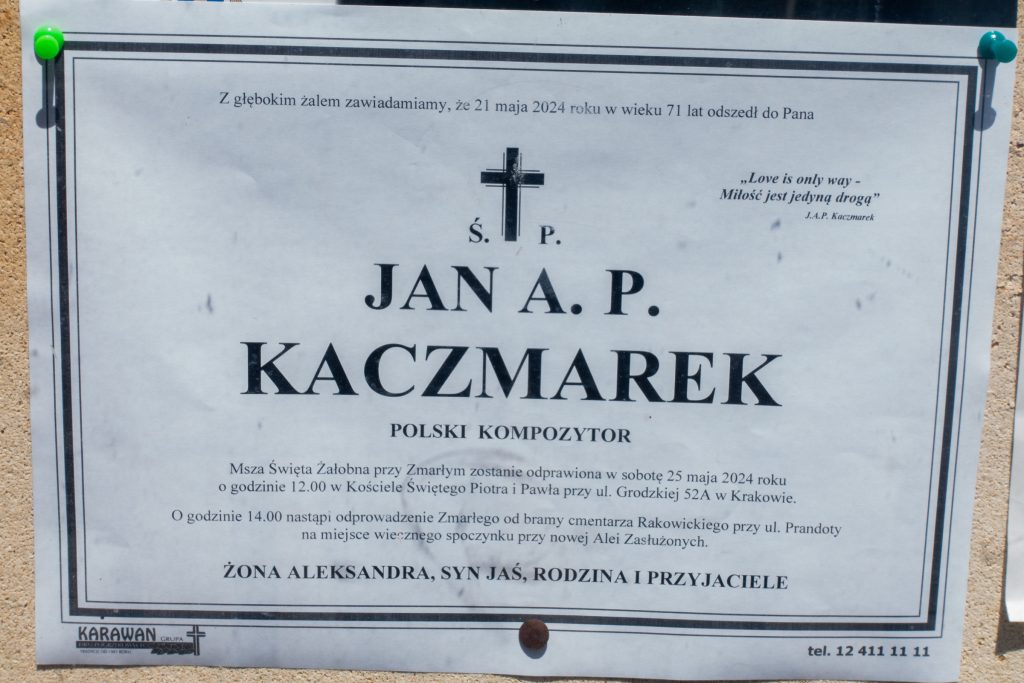
His funeral took place in Krakow on May 25, which was during the festival. I attended the service in the church for a short while and saw many familiar faces on the benches. People associated with the FMF participated. Artistic director Robert Piaskowski gave a wonderful speech, which was in Polish, but we were given an English translation afterwards. His music was also performed at the end of the ceremony by the string section of Sinfonietta Cracovia, conducted by Dirk Brossé, which was a fitting and honorable salute to the late Jan A.P. Kaczmarek and his family.
Conclusion
After writing about this festival for so many years, my conclusions for each edition have many similarities, mainly focussing on how brilliant this festival is. First and foremost it has excellent innovative and original concerts. It is also a great place for people in the film music industry to get in contact with each other, and it generates wonderful moments for film music enthusiasts who can enjoy these concerts and meet their favorite composers. This edition had all of that again, but this year, I started to notice more amazing, smaller things that are just as important. I saw, for example, that my Polish film music critic colleagues began to become more present than in recent years, rushing from one interview with a composer to another and hosting their own panel. I saw a Polish composer, who was sitting awkwardly by himself a couple of years ago, talking to everyone with a huge smile at the concerts and afterparties. At one moment, I saw Elliot Goldenthal walking to a fan who wore a self-made T-shirt with all his scores to ask why he did that, instead of the fan having to approach him. I said hi to a person I met as a young volunteer many years ago, who then showed me my seat and now holds an essential position in the festival organization. The last thing I want to mention is that when the host thanked an orchestra at the end of the concert, the audience always responded with a loud applause, making the musicians on stage smile, and I saw them feeling proud of themselves – rightfully so.
So yes, the FMF has all these brilliant concerts and panels, but what makes them such a force to be reckoned with is that they have it all together in one place for many days, and it is meant for a broad audience: fans, musicians, people from the industry and composers. So what I noticed this year is that all these people had a great time, felt appreciated and wanted to return next year. While this is fantastic, I have weirdly mixed feelings about it. On the one hand, I have a massive smile on my face because I had these unforgettable moments of experiencing fantastic concert highlights, meeting my friends, catching up with colleagues from the film music industry, and drinking the famous cider from Gorka Oteiza from SoundtrackFest. On the other hand, I feel annoyed and sad because I also want these magical moments in the Netherlands. We do have concerts, but they are safe, with most of the time the well-known pieces, mainly from John Wiliams, that I have heard many times. We rarely have famous film music composers over for fans to meet or have their music performed. I can count two of them in the last five years. Finally, we do have film music industry events, for networking and sharing knowledge, but these are stand-alone events. I would like to see us starting to combine all these events into one festival that everyone from fans, musicians, and composers want to go to and want to keep returning to; to see them having a great time and to see them grow. Like the Krakow Film Music Festival has been doing for so many years. So why don’t we make this happen? You can call me; I will gladly help out.
Photos
